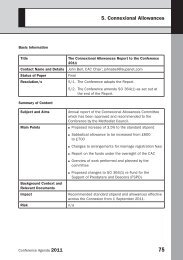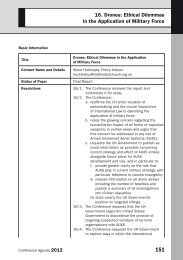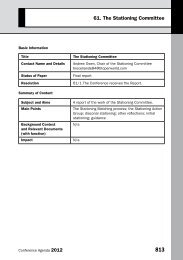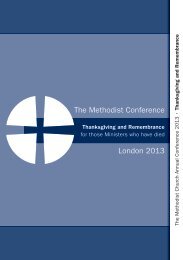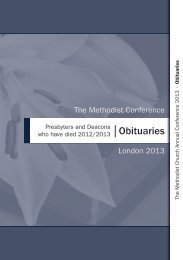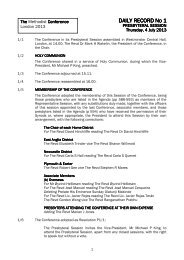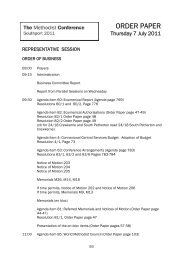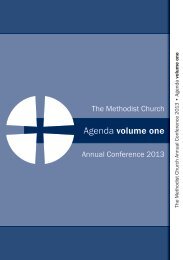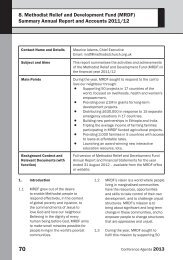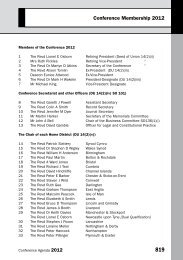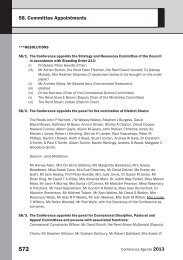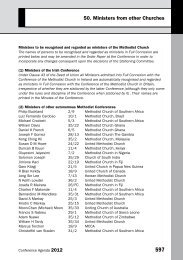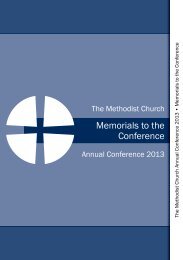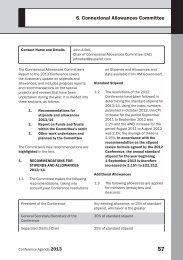Agenda Volume 3 - Methodist Conference
Agenda Volume 3 - Methodist Conference
Agenda Volume 3 - Methodist Conference
You also want an ePaper? Increase the reach of your titles
YUMPU automatically turns print PDFs into web optimized ePapers that Google loves.
57. The Fruitful Field Project<br />
ecumenical and other partnerships,<br />
including new and non-traditional<br />
ecumenical partnerships. In terms<br />
of the Committee’s description of<br />
the role of centres within the life of<br />
the Network (see paragraph 200<br />
above), the Committee noted that<br />
these aspects of Cliff College’s life<br />
and witness demonstrated that<br />
the College was fulfilling important<br />
aspects of such a role.<br />
223 Furthermore, the Committee noted<br />
that Cliff has long experience of<br />
adaptation and change in which a<br />
pattern of entrepreneurial innovation<br />
has enabled the College to respond<br />
rapidly and effectively to the needs<br />
of a changing Church. Indeed, the<br />
College’s consultation submission<br />
demonstrated a readiness to work<br />
creatively and innovatively to better<br />
serve the Church in the context<br />
of the vision put forward by the<br />
Ministries Committee. Further still,<br />
the Committee noted that Cliff<br />
College has not always been central<br />
to the Connexion’s activities in the<br />
fields of formation, learning, training,<br />
theological education, scholarship,<br />
research and development, and that<br />
this had been a loss to the Connexion<br />
as well as to the College.<br />
224 The Committee therefore saw<br />
few risks and many benefits to<br />
the identification of Cliff College<br />
as a centre within the proposed<br />
Discipleship and Ministries Learning<br />
Network, thus allowing Cliff College<br />
to develop as a fully-fledged centre<br />
within the Network, while also<br />
allowing the Connexion to benefit<br />
from Cliff’s ongoing engagement<br />
in a range of partnerships and<br />
programmes which have a life and<br />
a strong impact beyond Methodism.<br />
The Committee noted during its<br />
deliberations about Cliff College<br />
that the College did not have a<br />
history of forming and educating<br />
student ministers. It also noted<br />
that it would not be possible to<br />
expect the College, given its historic<br />
emphases and current expertise, to<br />
represent the breadth and diversity<br />
of <strong>Methodist</strong> theology. Consequently,<br />
the identification of Cliff College as a<br />
centre was only possible if more than<br />
one centre was to be recommended<br />
to the <strong>Conference</strong>.<br />
225 While considering these reflections<br />
early in 2012, the Committee was<br />
also conscious that Cliff College was,<br />
in some ways, uniquely vulnerable<br />
to a sustained period of insecurity<br />
about its future. The Committee<br />
has always recognised that The<br />
Fruitful Field project would usher in<br />
a period of insecurity for a number<br />
of postholders and institutions,<br />
but has also wanted to keep such<br />
insecurity to a strict minimum (see<br />
paragraph 14.7 above). Because of<br />
Cliff College’s reliance on self-funding<br />
student fee income and the limited<br />
degree of connexional grant support<br />
offered to the College compared to<br />
other institutions, Cliff College was<br />
particularly vulnerable to a potential<br />
drop in student recruitment caused<br />
by student insecurity about the<br />
College’s future in the light of The<br />
736 <strong>Conference</strong> <strong>Agenda</strong> 2012



